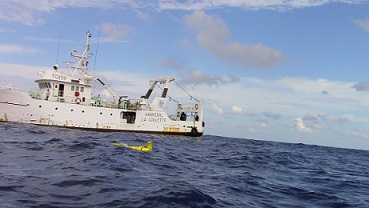How to study the sea

Related topics
Environment & climate action Innovation International cooperation France Italy Environment Tunisiadate: 06/08/2015
Project: Improving National Capacities in Observa...
acronym: INCOMMET
See also: CORDIS
The Incommet project, led by Tunisia’s National Institute of Marine Sciences and Technologies (INSTM), enabled the institute to pursue its strategic development and foster research excellence throughout its team with the support of French and Italian partners. It helped INSTM researchers to acquire new know-how, harmonise methodology with its partners and greatly improve its visibility, reports project coordinator Malika Bel Hassen.
A common concern
Why was greater harmonisation needed? “We share the same sea,” Bel Hassen explains, “and we need to have teams that can collaborate in an equal way in conducting research on this sea.”
The objective, she says, was to build capacity to deliver outstanding science and support the dialogue about global environmental challenges and sustained development in the southern Mediterranean region. “Phenomena such as climate change and biodiversity loss affect both the southern and the northern Mediterranean,” she adds. “Research teams that address these issues should work together.”
Incommet thus focused on the transfer of skills, mainly through study visits, workshops and training. It also enabled the INSTM to test various types of equipment loaned by its project partners, the University of Aix-Marseille in France and the Zoological Station of Naples in Italy. “Before deciding on investments, we were able to try out this equipment and see how it performs in our marine environment,” says Bel Hassen.
The project also tapped into expertise and research opportunities that Tunisia is particularly well positioned to provide — such as creating new knowledge about the enrichment of the marine environment by Saharan dust blown in from the desert. This enrichment increases the growth of phytoplankton, Bel Hassen explains, but it is unclear which dust-borne nutrients provide this boost, and by which mechanisms.
Valuable information can be gained in the Gulf of Gabès. “Saharan dust goes well beyond our Tunisian waters,” says Bel Hassen. “A number of European teams concentrate on this topic and have shown that it affects living resources in the northern Mediterranean Sea. So the idea is to use the Gulf of Gabès as a pilot site to study the phytoplankton response. It is strongly impacted by the phenomenon because it borders on the Sahara.”
Fresh insights could help to shed new light on a significant problem. “Some phenomena here in Tunisia, such as red tides, are closely linked to Saharan dust and desert storms,” Bel Hassen explains. “These red waters are caused by algal blooms, which can occur very quickly in the presence of excess nutrients. They have implications for key regional socioeconomic activities, such as fishing and tourism.”
Heading for international waters
Bel Hassen reports that Incommet was instrumental in raising the INSTM’s profile abroad. “It paved the way for our team to be connected to other researchers, to be visible and to contribute to further projects,” she notes.
New contacts were notably established with research organisations in Germany, Italy and Spain, and existing collaborations with partners in France gained momentum. Incommet notably contributed to the identification of research priorities regarding water and marine pollution in the Mediterranean region, in the wider context of the Mediterranean Innovation and Research Coordination Action (MIRA) project.
INCOMMET ended in December 2014, leaving a promising legacy. Greater awareness of the INSTM’s abilities has already translated into two new projects with EU partners. One of these focuses on sustainable tourism; the other aims to set up an observing system for various physical and biological parameters. Bel Hassen looks forward to further international collaborations plumbing the depths of the Mediterranean Sea.
Check also our publication Investing in European success - EU-Africa cooperation in science, technology and innovation
